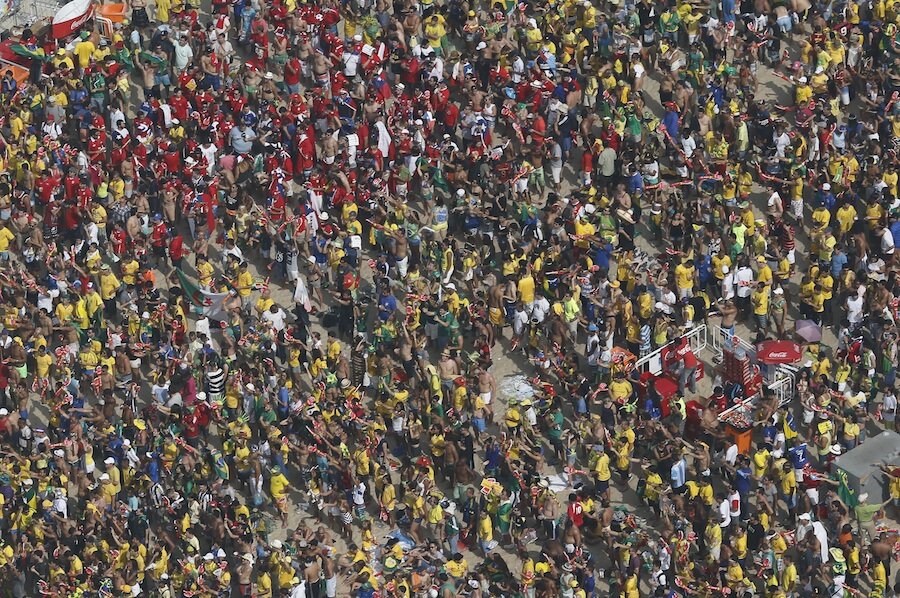Brazil as World Cup host: What happened to predictions of doom and gloom?
Loading...
The doomsday predictions that swirled in the leadup to Brazil hosting the World Cup now seem overstated, nearly three weeks into the global soccer tournament.
Instead of protests, chaos, and violence, this South American nation has erupted in a joyous tide of green, yellow, and blue after a series of dramatic home wins.
The World Cup is largely considered a barometer for the 2016 Olympic Games in Rio de Janeiro. For authorities, its early success has come as a welcome relief. “I knew that once the ball started rolling, Brazilians would be rooting for Brazil,” says retired military Gen. Fernando Azevedo e Silva, president of the Public Olympic Authority (APO), one of three Brazilian bodies tasked with coordinating the Olympic Games.
But not all observers are convinced Brazil’s mega-event-challenges are behind it. The Olympics will present a new set of tests for Brazil, says Christopher Gaffney, a professor at the Federal Fluminense University who studies the impacts of mega events on cities. International events are often used as political platforms, and “what we will see during the Olympics is a concentration of social movements that during the World Cup have been dispersed across 12 cities,” Mr. Gaffney says.
'Always optimistic'
The months leading up to the World Cup were riddled with international criticism, local naysaying, and heated confrontations between police and demonstrators. Protesters have derided Brazil's government for unbridled spending in a country where basic services like healthcare and quality education continue to underperform.
Now the APO can tout the relatively smooth soccer-filled weeks as evidence that the Olympics, just two years away, will also go off well. “We were always optimistic about our capacity to host the World Cup, and I am now certain that we will also have success in 2016,” says Azevedo e Silva.
Still, the success of one doesn’t automatically mean the triumph of the other, say analysts.
“The media heavily mediated [World Cup] expectations, which ended up being quite low,” says Gaffney. “With the amount of money and focus that have been put towards the World Cup, it should be going well,” he says. Brazil spent $11 billion on World Cup preparations with the eventual cost of the stadiums more than doubling from initial budget estimates.
Mega event attitudes 'permanently changed'
The Olympics are expected to bring new challenges. Aging infrastructure and insufficient investment in effective public transportation in Rio has been a frequently cited topic of concern. In 2016, the Brazilian Tourism Board (Embratur) expects 380,000 tourists to descend on the congested water-front city.
By comparison, an estimated 600,000 tourists are visiting Brazil's 12 host cities during the World Cup. (This year there were an estimated 920,000 tourists in Rio to celebrate Carnival, however, that celebration lasts for a much shorter period of time.)
On a visit to Brazil in April, International Olympic Committee Vice President John Coates said that preparations for the 2016 Games were “the worst” he had ever seen, citing social tensions, poor water quality in Guanabara bay where some competitions will take place, and delayed construction at Deodoro Olympic Park, the second-biggest Olympic venue. Construction there has yet to begin.
And while the World Cup has enthralled a soccer-loving nation, there is still widespread doubt as to how investments in World Cup stadiums – totaling $3.6 billion – and Olympic infrastructure will improve the lives of Brazilians once these events have ended.
“The World Cup has come as a ‘distraction’ right now, but opposition to the Olympics is still there,” says Mario Campagnani, a member of the Rio Popular Committee, a group of organizations who have denounced the lack of social inclusion in Rio’s urban policies. “The Brazilian perspective on mega events has permanently changed.”







